 MyDogBreeds
MyDogBreeds Schnoodle is originated from United States but Gull Terr is originated from Pakistan. Both Schnoodle and Gull Terr are of same height. Both Schnoodle and Gull Terr are of same weight. Schnoodle may live 3 years more than Gull Terr. Both Schnoodle and Gull Terr has almost same litter size. Schnoodle requires Moderate maintenance. But Gull Terr requires Low maintenance
Schnoodle is originated from United States but Gull Terr is originated from Pakistan. Both Schnoodle and Gull Terr are of same height. Both Schnoodle and Gull Terr are of same weight. Schnoodle may live 3 years more than Gull Terr. Both Schnoodle and Gull Terr has almost same litter size. Schnoodle requires Moderate maintenance. But Gull Terr requires Low maintenance
 The Schnoodle was developed in the 1980s. It is believed the dog originates from the USA. This was when it was discovered that breeding the poodle with other dogs produced excellent mixes.
The Schnoodle was developed in the 1980s. It is believed the dog originates from the USA. This was when it was discovered that breeding the poodle with other dogs produced excellent mixes.
The idea with the Schnoodle was to develop a low-shedding dog. The Schnoodle is a mix between a Schnauzer and a Poodle,but because both the Poodle ad Schnauzer have different sizes, there is no knowing what size the Schnoodle will be.
Major kennels don’t recognize the Schnoodle as a breed.
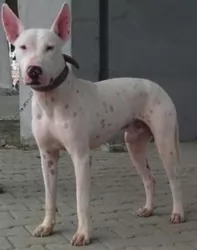 The Gull Terr hails from Pakistan. Having been introduced to the country by the British Raj, the dog has always been valued for its guarding and fighting abilities.
The Gull Terr hails from Pakistan. Having been introduced to the country by the British Raj, the dog has always been valued for its guarding and fighting abilities.
The British army, on bringing English Bull Terriers with them, mated them with local dogs. The dog was in other words, created from the old bull terrier which became extinct, and the Bully Kutta.
The Gull Terr or Pakistani Bull Terrier as he is known is a rare breed of dog. Today they are usually found in rural areas of Pakistan as well as in the Indian Panjab area, becoming popular as both pet and watchdog. It is no longer used for dog fighting as this has been banned.
 The Schnoodle is a cross between a poodle and a schnauzer and with the poodle parent in the mix, the dog is considered to be hypoallergenic.
The Schnoodle is a cross between a poodle and a schnauzer and with the poodle parent in the mix, the dog is considered to be hypoallergenic.
Because there are three sizes of Schnauzer, the Schnoodle can be medium sized but also fairly large. Weight of this dog can be anything from 6 to 45 Kg and he can stand at between 38cm to 66cm. The coat can be either wavy, straight or curly and will need to be brushed, stripped or clipped according to the coat they have.
The most common coat colors are grey, a mix of grey, silver and white, a fawn or creamish color and black. The medium sized ears are floppy.
Because this is a mixed breed you won’t get a fixed personality type and you won't find fixed looks. Because the dog comes from two excellent parent breeds, you can expect your schnoodle to be friendly, alert and very active.
They may not take readily to kids so it is up to the human owners to see that their children are brought up to be kind and respectful to dogs and animals. Your Schnoodle can be gentle too and stubborn but he will bond closely with his human family.
The smallish size of these dogs makes it a good choice for city or country life, but wherever he is, he will need lots of exercise. Schnoodles are smart and respond well to training.
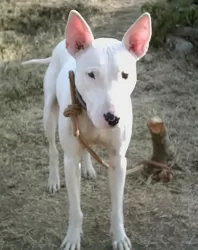 As a medium sized dog, the muscled Gull Terr stands as 45 – 66cm in height and weighs in the area of 40 – 45kg.
As a medium sized dog, the muscled Gull Terr stands as 45 – 66cm in height and weighs in the area of 40 – 45kg.
The dog has a short, smooth coat which is white, but you may find some black spots on him. He has a egg shaped head, ears are naturally erect, dark slanted eyes, and he has a long tail which is held upwards. Muscled and agile, he is a powerful working breed and makes a good watchdog.
This is an aggressive dog breed, and first-time dog owners might want to have a more amicable kind of pet to start off with.
He is a fearless dog, somewhat aggressive and suspicious towards strangers and therefore wants to protect his owner from them. With training and socialization he can be good with children in the home, although he is inclined to be boisterous and stubborn. He has fierce protective instincts, even though he is considered not as aggressive as some other Pakistani dog breeds.
The Gull Terr will need an experienced dog handler. Even though he has been a fighter in his day, he is capable of being an excellent family pet as well. You won't have trouble training him as he is intelligent. He then becomes more obedient and more manageable. He is a very active dog and therefore he won't fit into city dwelling where there are small spaces. He needs a place to run and on top of that he will require a good deal of exercise.
 Thanks to their parents, Schnauzer cross Poodles are smart, easy to train and fast learners.
Thanks to their parents, Schnauzer cross Poodles are smart, easy to train and fast learners.
Schnoodles are also fun-loving dogs, and they make great playmates for children. They are also a good choice for first time dog owners. A bonus part for dog owners is that these dogs are low shedding, making them great for anyone who suffers from allergies.
The Schnoodle forms strong bonds with their human family and this makes them both protector and watchdog. He is a great family dog with some excellent characteristics from each of the parent dog breeds involved.
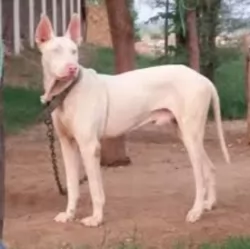 Your Gull Terr love the attention he receives from his human family and he won’t flourish at all if he is put into the back yard for watch dog purposes only. He is a dog that needs to come indoors to be with his family.
Your Gull Terr love the attention he receives from his human family and he won’t flourish at all if he is put into the back yard for watch dog purposes only. He is a dog that needs to come indoors to be with his family.
He tends to be somewhat aggressive and this is why he isn’t looked upon as the ideal pet for first-time dog owners and those with young children in the home.
He is a confrontational dog, willing to enter into a fight with provocation. Strong willed he will require early training and socialization, and when he is brought up by a firm, consistent, kind owner, he can get over his aggression and become a loyal, devoted, protective and loving pet.
 The Schnoodle is a robust, healthy breed, but unfortunately he can also succumb to any one of the many dog illnesses there are -
The Schnoodle is a robust, healthy breed, but unfortunately he can also succumb to any one of the many dog illnesses there are -
This refers to an eye disease which results in the deterioration of the retina. Your dog develops night blindness and this can lead to total blindness. Unfortunately there is no cure.
It can be horrible seeing your pet jerking and twisting out of control with seizures. You will need to get your pet to the vet as epilepsy can be a symptom of a bigger issue.
This is a life threatening disease where your dog’s stomach fills with gas and becomes hard and swollen. The stomach can twist. Symptoms of bloat include restlessness, drooling and trying to vomit.
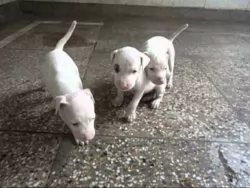 The Gull Terr has a deep chest and this means he is more prone to bloat, a condition known as gastric dilation volvulus.
The Gull Terr has a deep chest and this means he is more prone to bloat, a condition known as gastric dilation volvulus.
Your pet's stomach fills with air and this leads to decreased blood flow to vital organs. The stomach can twist and this is when the condition becomes life threatening as blood supply to the stomach is cut off. Instead of feeding him large meals, feed him smaller meals more frequently.
Deafness in your pet can be temporary or permanent, in one ear or both. There are are so many reasons why your pet could be deaf and it could be a birth defect, an infection or old age. Certain dogs such as the white coated Gull Terr are also more predisposed to congenital deafness.
Get him to the vet who will examine your dog’s ear canal for wax and debris and discuss the way to go for your beloved pet.
 The Schnoodle is a dog that will need a good dose of exercise. Provide him with daily walks, walks in the park, hikes, runs along the beach as well as ball and rope games.
The Schnoodle is a dog that will need a good dose of exercise. Provide him with daily walks, walks in the park, hikes, runs along the beach as well as ball and rope games.
Always try to feed your dog a high quality food. Many people give their dogs one of the commercially manufactured foods there are because they are wonderfully convenient, and you get some good ones.
You don’t want to give this food to your dog day after day after day. Feed him some home-made food occasionally which can be added to his dry kibble twice a week. Boiled chicken, brown rice or pasta and spinach, sweet potatoes and carrots are a healthy choice for your pet.
You can boil it, chop it all up and add smaller portions to the dry kibble twice a week as a wonderful, tasty treat for your dogs.
Try and include some raw meat into the diet as this can help to fight of skin diseases. Ensure there is always a bowl of fresh, cool water for him.
Make sure all the necessary vaccines are up to date to avoid some of the deadly canine diseases there are.
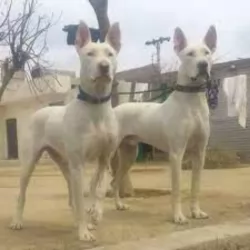 Easy to look after with his short coat, the Gull Terr will only require a brushing twice a week to keep the coat shiny and healthy.
Easy to look after with his short coat, the Gull Terr will only require a brushing twice a week to keep the coat shiny and healthy.
Because his coat is white, it can show dirt easily, and it will simply require taking a damp cloth and wiping the mark off him. You don't want to be bathing him often as this dries his skin out – rather just wipe the coat down.
Your Gull Terr is a highly energetic dog and he loves nothing more than to be involved in robust exercise and games. He is best suited in a home with large grounds and if you do opt to have him in the city, you will have to pay close attention to his exercise needs – lots of walks, runs, ball games, swimming and running with you as you cycle.
You want to be sure that your energetic Gull Terr has a healthy diet full of important proteins, fats, and carbohydrates.
Protein is always important for a dog like this and you want to make absolutely sure that apart from his high quality kibble, you mix in raw meat from time to time as well as cooked chicken, fish, brown rice and vegetables.
When looking for a commercially manufactured dog food, look for high-quality animal protein as a top ingredient. Make sure he always has fresh, cool water available to him.